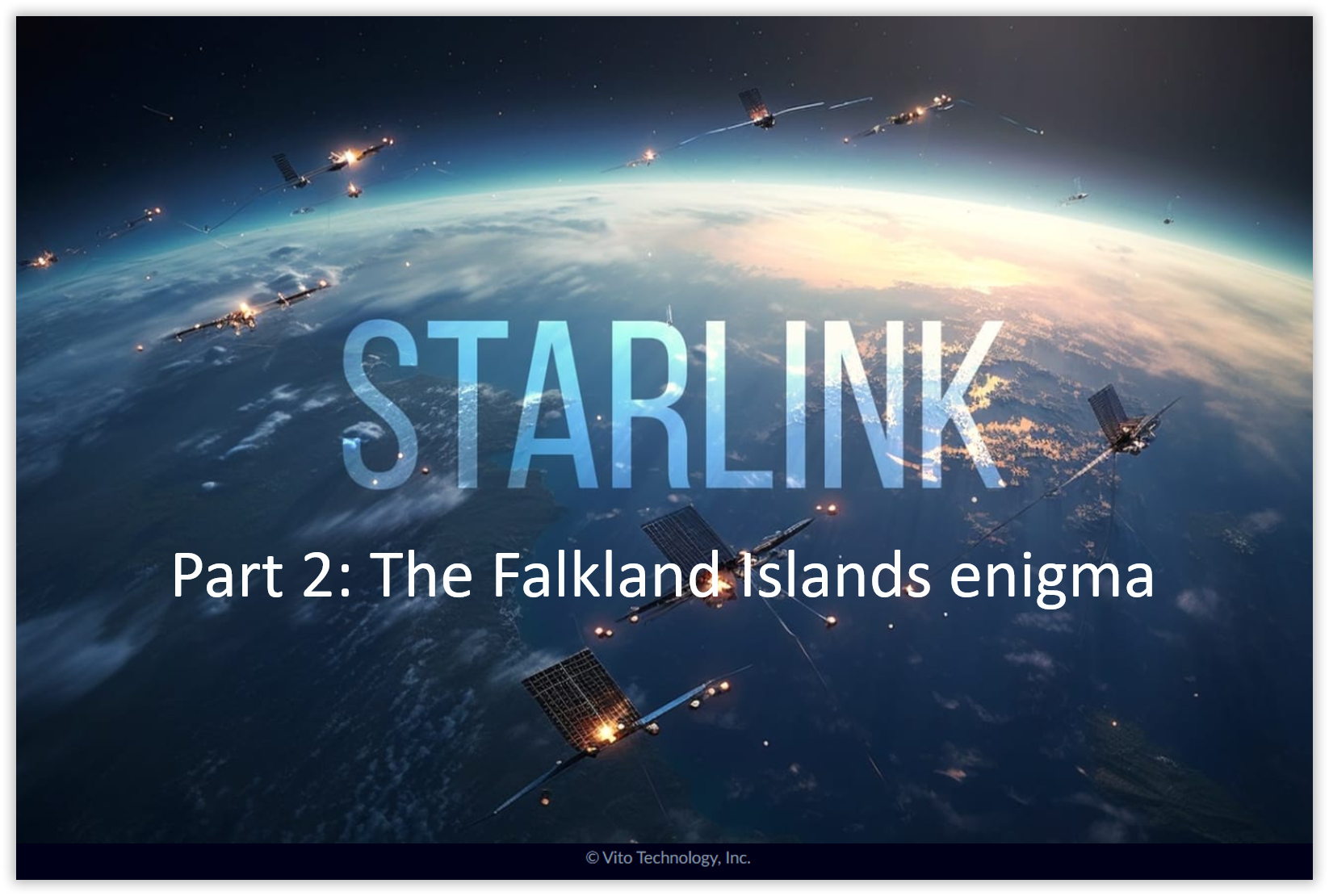
In Part 1, The Ascension Island story, the history of Starlink adoption on Ascension Island was outlined, although this story is far from finished. Part 2 focuses on Starlink in the Falkland Islands. Much has been written and discussed about Starlink in the islands’ media recently, as things seem to be coming to a head. If you are interested, please sit in a comfortable chair with a cup of coffee and read, watch and listen, but please look at Part 1 first.
I would like to thank the islands’ media, Penguin News, Falkland Islands Radio, and Falkland Islands TV for their efforts in fully reporting the current Starlink situation.
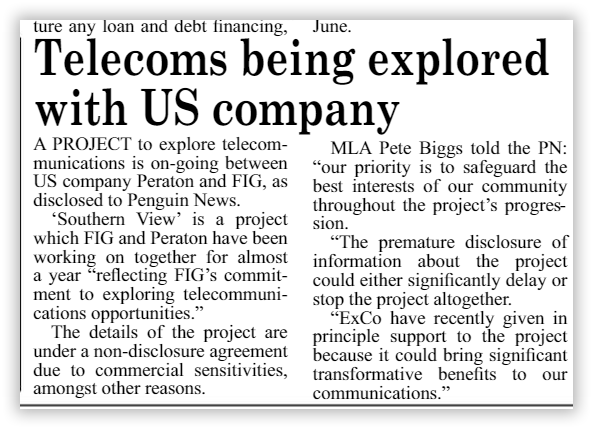
Peraton’s About page says that:
“Peraton drives missions of consequence spanning the globe and extending to the farthest reaches of the galaxy. As the world’s leading mission capability integrator and transformative enterprise IT provider, we deliver trusted and highly differentiated national security solutions and technologies that keep people safe and secure.”
![]() On the 10th of April 2024, Penguin News published this piece:
On the 10th of April 2024, Penguin News published this piece:
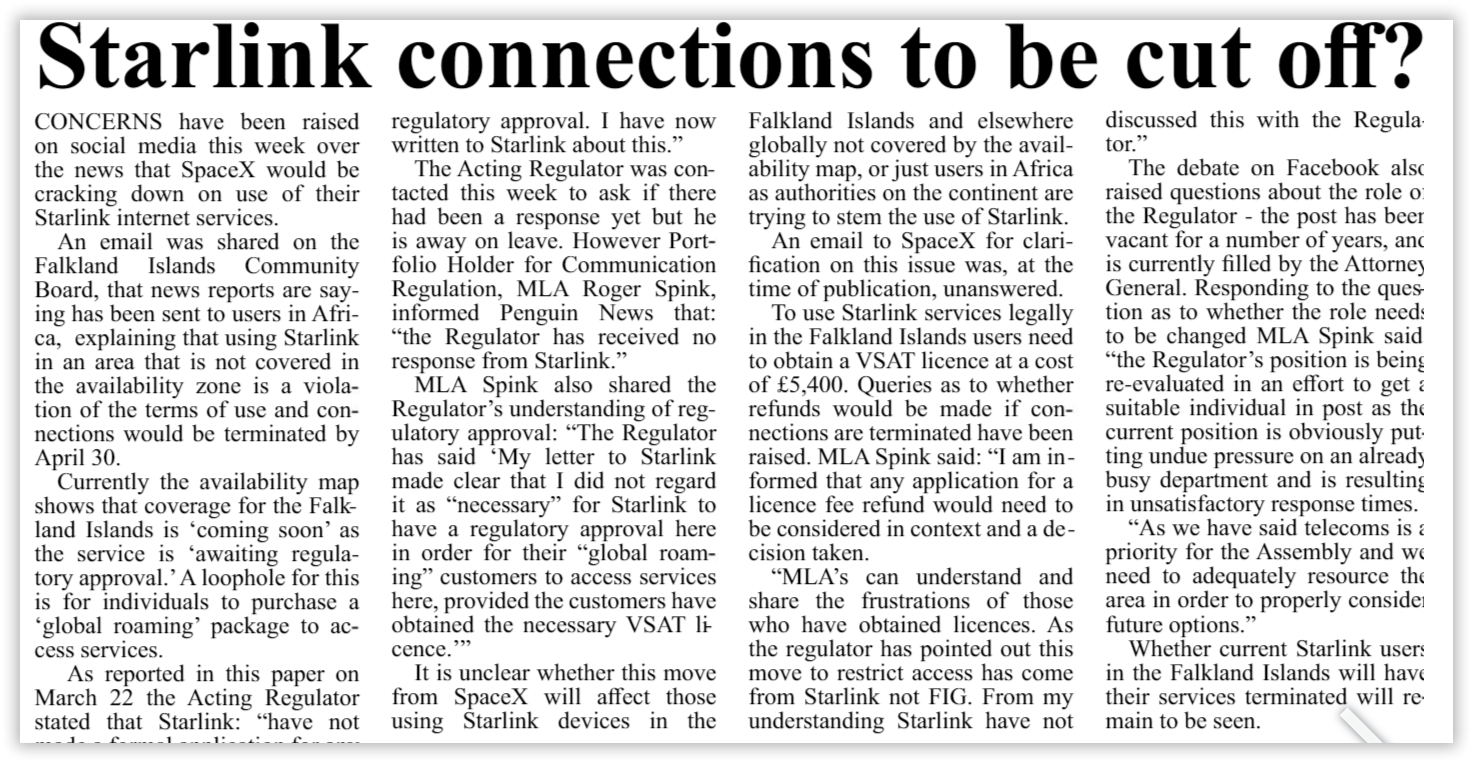

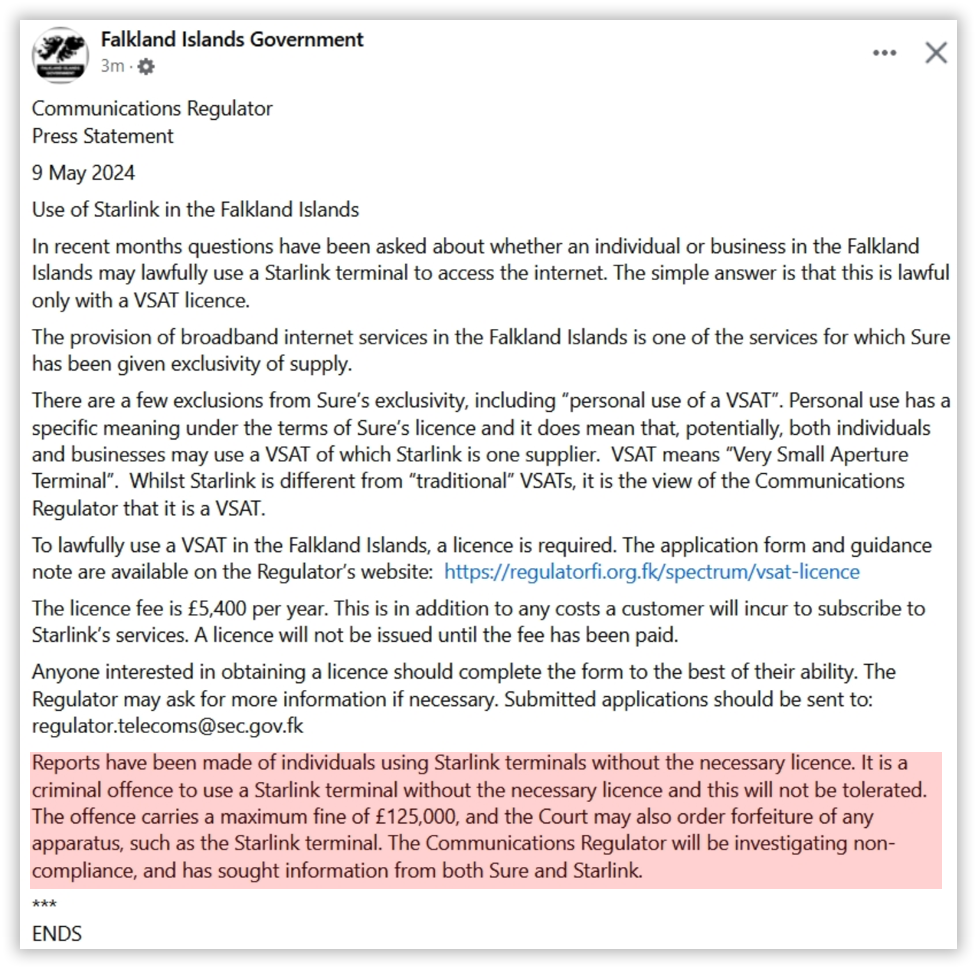

 Observations
Observations
Falkland Islands Government’s public stance.
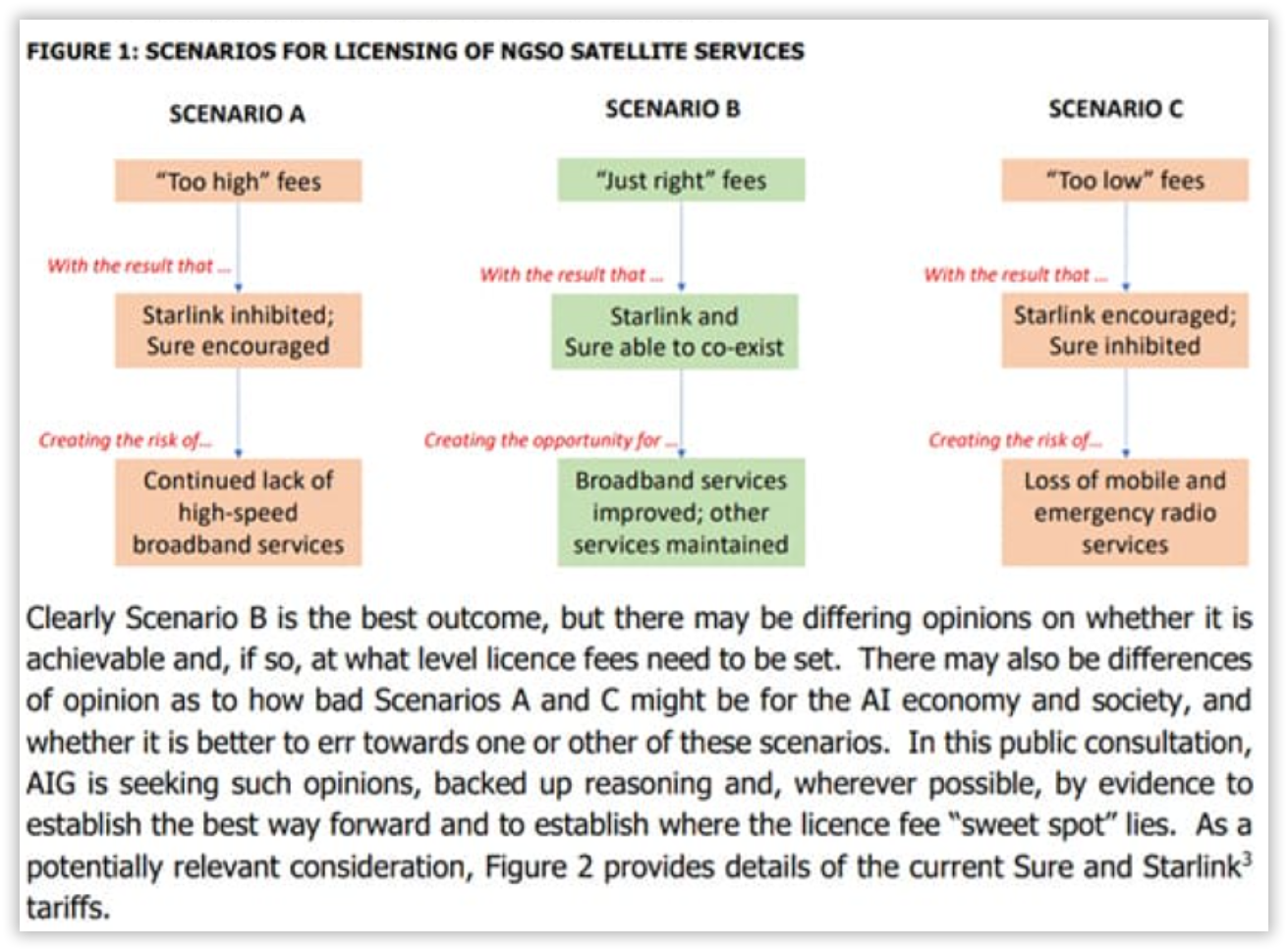
The overt public adoption of Scenario A is not beneficial to Falkland Islanders or a move to providing 21st-century communications. Existing Internet services are exceedingly sluggish, with the 1Gbit/sec (ish) Intelsat geostationary satellite capacity dramatically insufficient for the island’s needs. Numerous business and consumer cloud-based services will not even work with round-time latencies of 850mS.
The benefits of low-Earth orbit (LEO) satellite-based services are now a reality in the Falkland Islands, and consumers and businesses are fully aware of this. However, the realisation that this is starting to take centre stage has been recognised way too late.
A ‘committee approach’ of hiring an expensive telecommunications consultancy and writing a lengthy report in preparation for Sure’s monopoly’s end in 2027 does not ‘cut the mustard.’ Starlink is here today, and its legal usage at a reasonable cost should be addressed.
The press release.
Regulatory bodies must communicate legal requirements and consequences for non-compliance. However, the Starlink statement’s tone and wording (“this will not be tolerated”) could be interpreted by many as aggressive, harsh or even threatening. However, ensuring such communications are respectful and not overly intimidating is essential. Authorities should balance firmness with clarity and empathy.
The tone of this particular press release could have been softened without compromising the message’s effectiveness. A more customer-friendly paragraph could have been used:
The press release stated that information has been sought from Starlink and Sure. Starlink would never inform the Regulator about users’ activities due to commercial and personal privacy concerns. It seems naive to ask or even state that this step is being undertaken.
Approaching Sure for information seems somewhat questionable, too. Their Code of Practice states:
“We will treat any information we have about you in confidence and will not disclose it to anyone except yourself, or in accordance with any instructions you have given us. However there are circumstances in which we may be required by law to disclose information, such as requests from Statutory Authorities, for example Police Force or Customs and Excise. Any such disclosures will be strictly controlled.”
If letters are sent to some of Sure’s customers saying they are suspected of using illegal Starlink terminals, this could be considered highly threatening and questionable, as it is based on nonsequitur logic not befitting a government. Also, this action completely disregards consumers’ privacy, as extolled in the privacy statements of Sure, FIG and Regulator.
Starlink needs regulatory approval.
The Acting Regulator stated that Starlink has been approached about two issues: (1) Asking them about who uses Starlink illegally in the Falkland Islands and (2) to discuss providing regulatory and/or user approval.
It was stated that Starlink has not yet asked the Regulator for approval. This is not surprising. Why would Starlink request approval when the FIG has a punitive licencing model to prevent widescale Starlink uptake? Any marketing person at Starlink would be highly confused by this conflicting stance. Why would Starlink, who would only collect revenues of around £75, while FIG gets £450 a month for each consumer with no effort? This would be frowned upon by Starlink or any other service provider. Knowing the attitudes and practices of the USA companies, they would be happy to bypass the Falkland Islands on principle if this continues.
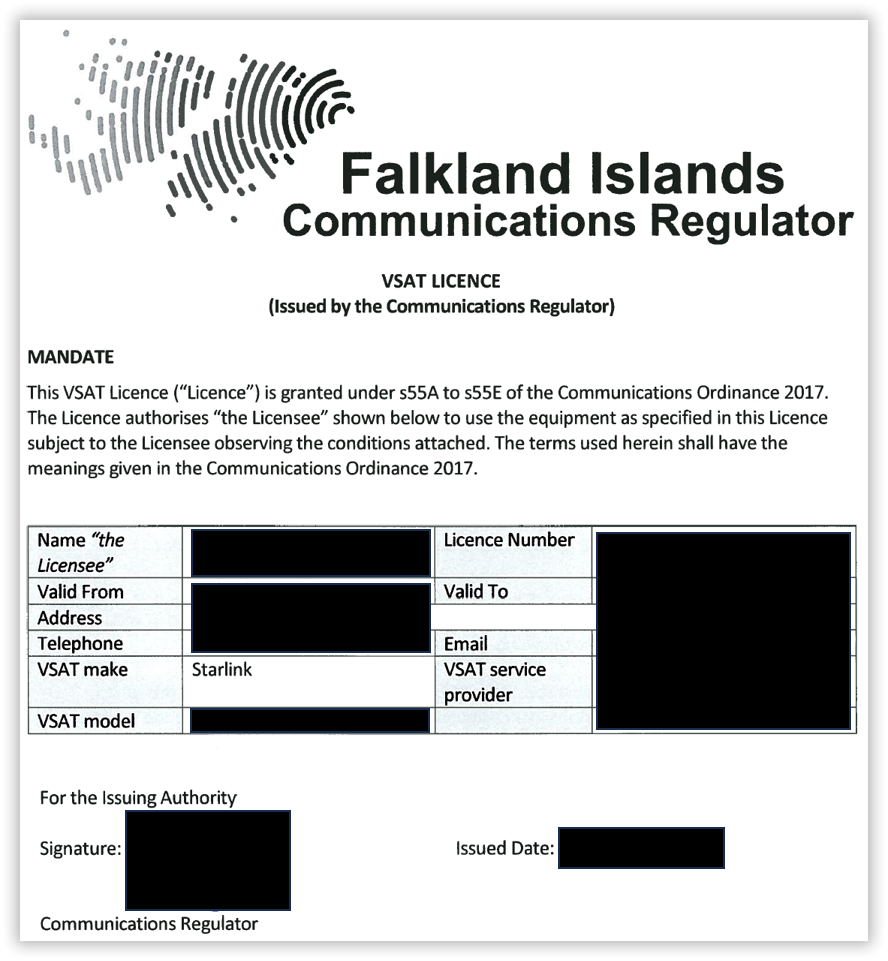
StarLink service termination
I have no idea how many illegal installations there are in the Falkland Islands, but it is rumoured that 12 official £5,400 Starlink VSAT licenses have been bought. These will be cut off, too. Providing Regulatory Approval and/or User approval to Starlink should be at the top of the Acting Regulator’s in-tray!
Finishing off.
This has been a much-too-long post, but as the Ascension Island Government has experienced, the Falkland Islands are at a telecommunications tipping point. As we all know, technology has advanced exponentially in recent years. Technology can not be held back, no matter who tries and what laws are implemented.
There is little risk that Sure will not leave the Falkland Islands if Starlink is allowed, even if it is threatened. Far too much money is available by the continuation of providing all the other communication services to the islands, as demonstrated in other Sure territories. Moreover, I would imagine that most Starlink users will want to maintain an – albeit smaller – Sure account for backup reasons. A good proportion of Sure’s broadband users would not be interested in Starlink anyway as they are perfectly happy with the download speeds available from Sure. Co-existance is the name of the game.
Ascension’s Option B is a perfectly workable scenario for the Falkland Islands. Starlink can be made available at a low cost. Sure continues to provide an Internet access service for Internet resiliency (which still doesn’t exist) and all the other services through a universal service obligation. This would even be the case if 50% of households took Starlink. Yes, FIG may have to increase its subsidising budget.
‘Behind the Curve’ discussions now seem to be taking place between the Acting Regulator, FIG and MLAs, and I’m sure this is welcomed. I’m also sure that MLAs listen to what consumers want regarding Starlink. It is just not a sustainable stance that the status quo of a £5,400 VSAT licence is maintained for another three years. This was a strategy for 2017, but it is not viable for 2024.
FIG and MLAs need the courage to face the possible challenges and consequences of proposing to change the law to reduce VSAT licence fees to a reasonable level. Contracts and laws can be changed, and even though negotiations will be painful and possibly costly, emergency action is required now. FIG are already considerably subsidising Sure’s Intelsat satellite capacity and the installation of the OneWeb earth station, so this is just one further, albeit difficult step. If this is not done, consumer pressure will only escalate ever more quickly. The first step is recognition that this is the right thing to do for the islands’ digital future.
Epilogue
Several sources have indicated that several hundred Starlink terminals (not including military imports) are in the islands. I can’t confirm this and have no objective data on how many could be in actual use. If so, this suggests that emergency action in the form of an ‘option B’ adoption should / must be taken soon. Interesting times!
Chris Gare, OpenFalklands May 2024, copyright OpenFalklands


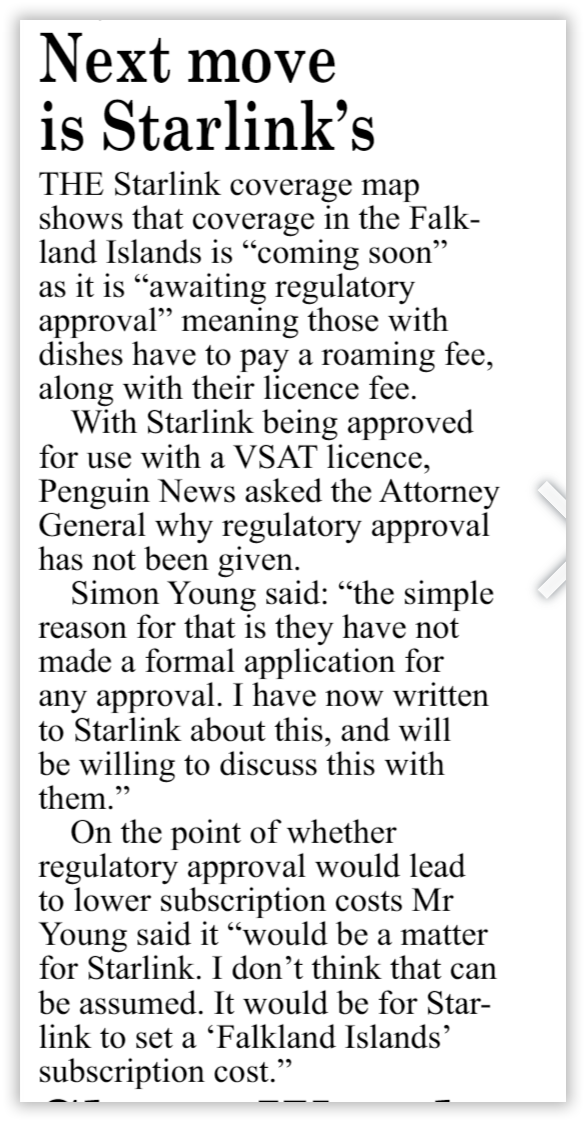
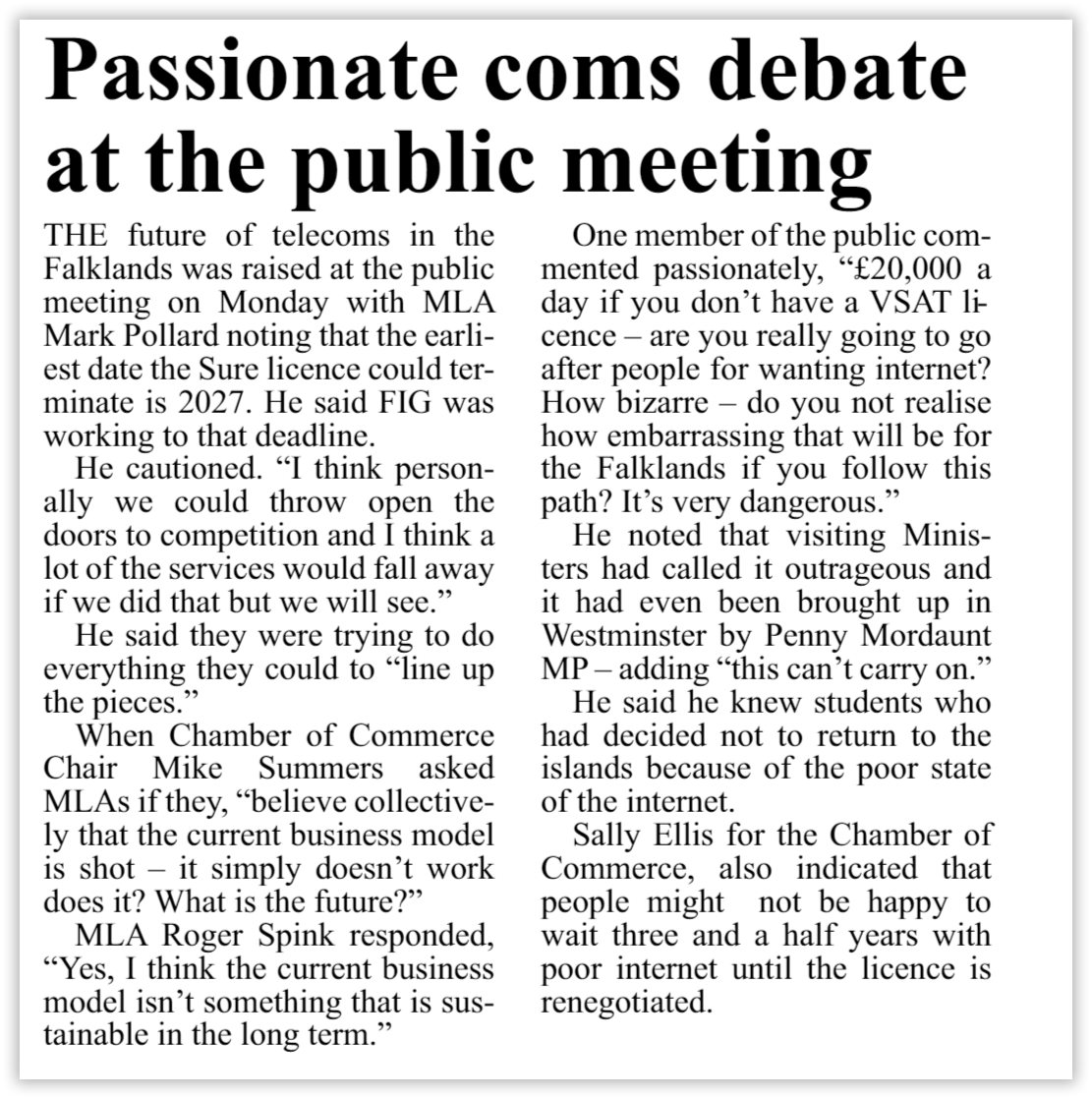
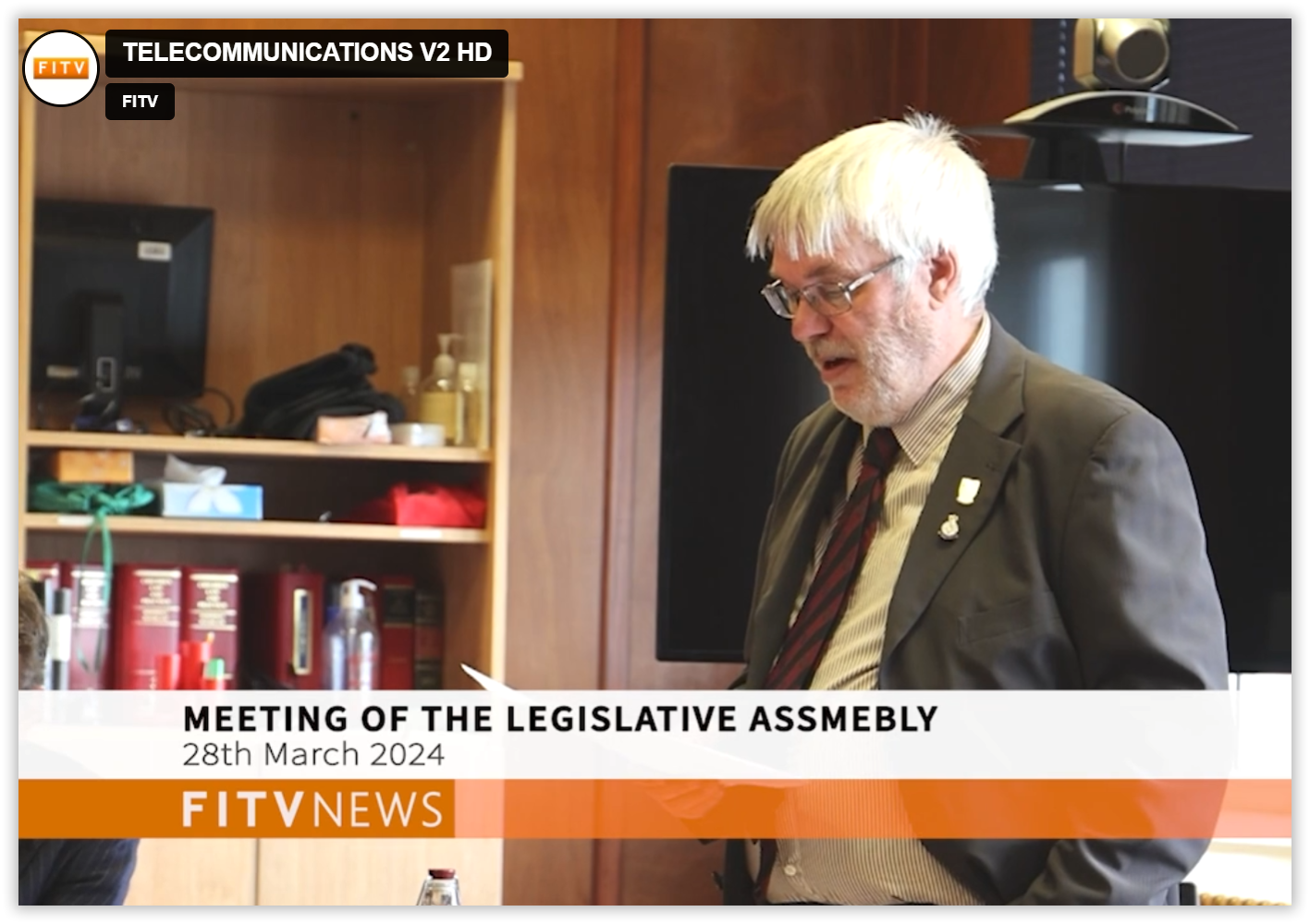
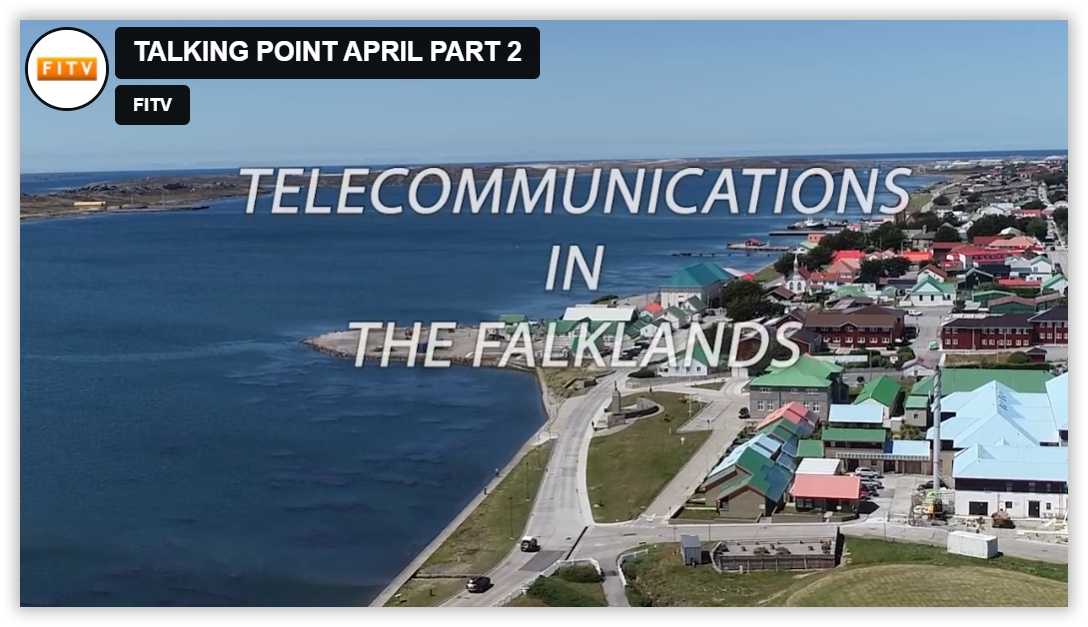
Cheers for the detailed coverage. I’m not at all connected to the Falklands, but somehow you were on my timeline, and I fell down the rabbit hole. Such is life in the internet age.
The technology behind these LEO megaconstellations is quite different from the GEO satellites. Starlink cannot redirect service to high-demand areas, unlike Intelsat. It will no doubt cause you despair that as I’m typing, there are tens, maybe hundreds of Gbps going to waste on Starlink over the islands. But probably it shouldn’t. With this technology, for once, the remotest areas like the Falklands are advantaged.
Given this fact, I feel like the approach taken by the islands government is not strategic enough. They are way overthinking this. Looking at the rocket launch manifests, it is crystal clear that Starlink will be the dominant seller of bandwidth globally for the next decade or more. Nobody will have supply within an order of magnitude or more. So the islands need to develop a strategy to ask SpaceX, the owner of Starlink, very nicely for that bandwidth.
Part of asking very nicely is to make it as simple as possible for SpaceX to serve the islands. Dead simple. At most, the government probably can ask for the company to collect a certain amount in taxes. That entails a single entry in a database and making a payment to the islands government each quarter. Anything more and the government risks SpaceX’s attention going elsewhere. The AG asking for information about users in the Falklands is the exact wrong thing to do. Focusing on Sure, or Intelsat, or Oneweb, is a misdirection of energy.
Best wishes on this! I know how frustrating this can be.
This is yet again a cautionary tale about granting government monopolies, especially in a competitive and fast moving market, such as telecommunications.
However, what really boggles the mind is the sheer insanity of granting a twelve (12!!!!!) year government monopoly on telecommunications services. In the past 35 years consumer Internet speeds have grown to one million times faster. Not one million percent, a MILLION TIMES faster. Who in their right mind locks in a provider for a DECADE in such an environment?
Connectivity to the Falklands has always been woefully underdimensioned. Just to meet the bare minimum of modern communications it would need to be ten times higher than what it is today. This has always been the case, things have just come to a loggerhead when Starlink made it obvious.
The root issue is that the FIG is run by a bunch of amateurs, who have no business writing telecom law. They should have consulted with subject matter experts and other regulatory agencies. Telecom monopolies should have gone they way of the dodo decades ago.
The legislation states that the government should promote investment and innovation in electronic communications networks and services
Instead the regulator is threatening fines and penalties.
Instead of monopolies, the FIG should encourage self provisioning and the building out of networks by any means necessary. Instead of monopolies, there should be public tenders and subsidies if need be. Instead of monopolies, the FIG should own bottleneck services such as international connectivity and hard assets such as towers and fiber optic cables. Let everybody operate networks over public assets to the best of their abilities.
There is indeed a problem with too few people wearing too many hats in small jurisdictions – in Gibraltar back in 2010, the government decided to make the Minister of Communications the Chairman of Gibtelecom, but it was only because Gibraltar was in the EU, and subject to EU Directives, that it was taken to task over this conflict of interests.
By contrast, what right of redress would people in the Falklands have had then, never mind now? I was in touch with a member of the recent UK parliamentary delegation, who said that while they were hesitant to get involved in what was a domestic matter, the dire state of internet access came up again and again in discussions with people in the Islands.
St Helena’s new Communications Ordinance, yet to come into force, makes provision for an independent communications regulator, but the Falklands experience does not augur well. In addition, the holder of the post will not be able to draw upon the expertise of a larger talent pool, as the Chief Executive of Ofcom does, or even her counterpart at the Gibraltar Regulatory Authority does, in a jusrisdiction with ten times the population of the Falklands.
Unfortunately, some in the Falklands have come to the defence of Sure, not because of the quality of its service (what service?) but because of its socioeconomic role, with an appeal to emotion (‘Would Starlink send out someone to help a little old lady in Camp configure her router?’)
Well, maybe Elon Musk wouldn’t personally, but I’m sure there are many on the Islands who would, and while Starlink operates on a business to consumer basis, unlike OneWeb, which is business to business, it does have authorised resellers in countries, like Noel Leeming in New Zealand – https://www.noelleeming.co.nz/c/selected-deals/starlink
FIC could perform a similar role in the Falklands, a case of yet another pie to put its finger into.
Perhaps the trade-off might be higher prices for local Starlink subscriptions than those made via the UK or elsewhere, but these should still be considerably less than the fastest Sure package or the VSAT licence fee, albeit more than the £10 a year (!) for the licence fee payable in Ascension.
The CEO of Sure Falkland Islands stated in a recent FITV interview that Starlink does not have any resellers therefore Sure could not undertake this role. This is incorrect.
Indeed. As it happens, Starlink’s Direct To Cell is on its way, with voice and data due to launch in the next year – https://www.starlink.com/gb/business/direct-to-cell
And one of the partners will be Entel in Chile – https://www.entel.cl/starlink
Chris,
Thank you for summarizing nicely the situation that the islands legislature have slow-walked us into.
Sadly, the approach of turning a blind eye to people’s needs, creating laws to deliberately deter freedom – in an island that celebrates its liberation yearly – and fostering a comms structure that encourages younger people to stay awake after midnight, leads us into this ridiculous state of affairs.
As a previous commenter has said, the regulators role here is a particularly difficult one.
The key thing to turn back and reflect on is that the aims of the role are enshrined in the legislation itself. I particularly like this bit:
(f) to promote investment and innovation in electronic communications networks and services;
I would suggest that when planes are stuck on the tarmac, unable to have digital updates applied, when transferring patient data for external diagnosis, when the whole country grinds to a halt, and is lucky enough to have had a yacht tied up with a Starlink dish. When this farce is the state of the islands comms infrastructure, we deserve nothing more than the world’s contempt.
To solve this situation requires one thing only; we need to allow people to be able to choose Starlink as their ISP. Some will, and some won’t, but you can bet your last pound that while FIG try to effectively ban its use with a £5,400 licence fee, that will only encourage more people to turn their back on behaving lawfully. The legislation is bad law, created deliberately to prevent people exercising their freedom, and the consequences are of MLAs making. Only they can fix it.
Thank you for this comment, appreciated.
You highlight a much wider problem than this issue. It is common knowledge that in lowly populated territories like the Falklands, you tend to find “big fishes in a small pond”, with postholders such as an Attorney General one of the most prominent. Plus of course as one of few qualified lawyers, often the only one, he or she commands unquestioned authority. Also of course with small territories, it is also common for people to “wear more than one hat”! So it is here. Now whoever does that will be conscious of it, and profess to take care to separate out issues and interests, but the reality is, they don’t and they can’t be seen to be doing so. Everyone has their order of priorities. I suggest that this is the case here, as the “regulator”, whose role is “to regulate for the protection of the vulnerable, the environment, social or other objective”. Certain primary loyalties will come first – the reason why they are there, who they work for and who foots the bill for them – so there is an inevitable conflict of interests. Furthermore be wary of “external” technical consultants, they won’t correct that bias, given who also pays them and briefs them. They are never truly independent. Any that do demonstrate independence soon find no more commissions come their way!
Thank you for these comment, appreciated.
Thank you for this comment. Appreciated.